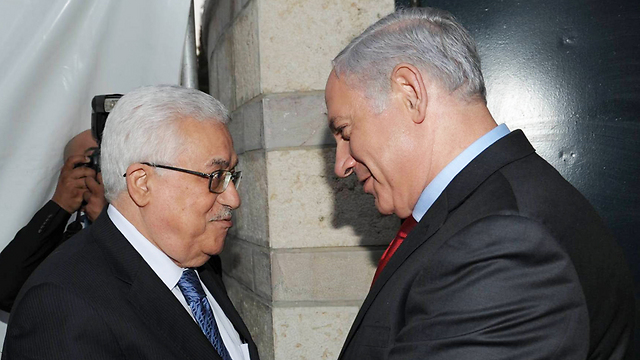
Prime Minister Benjamin Netanyahu and Palestinian President Mahmoud Abbas
צילום: רויטרס
Breaking the perceptual circle
Op-ed: Defining the objective of an Israeli-Palestinian process will allow moderates on both sides to believe it is achievable and overcome the gap between the broad desire to reach a two-state solution and the depressing reality.
A survey published several days ago found that 59 percent of Israelis and 51 percent of Palestinians support the two states for two people solution. In addition, about one-quarter to one-third of those who oppose this solution (in other words, about 10 to 15 percent of the entire public) would move over to the supporters' side given external moves supporting the agreement, and first and foremost if the agreement were achieved as part of a regional agreement. In other words, close to 70 percent in both publics would support a permanent agreement of two states for two people given achievable conditions.

The poll was conducted by the Israel Democracy Institute in cooperation with the Palestinian Center for Policy and Survey Research and was run by Prof. Tamar Hermann and Prof. Khalil Shikaki.

The moment there is a concrete reference point which both sides can address, the moderate majority may demand that its leaders work to advance the conditions for the creation of a better reality (Photo: Amos Ben Gershom, GPO) (צילום: עמוס בן גרשום, לע"מ)
The poll further found that the public on both sides believes the level of support for the agreement is much lower: "Findings show significant Palestinian-Israeli mutual misperception and that this mutual misperception is positively correlated with hardline views. In contrast, clarity/accurate perception about the views on the other side is positively correlated with greater willingness to compromise."
In other words, the more the real opinions on each public are reflected objectively to the other side, the higher the chances for an agreement.
Ironically, however, even the poll itself, which is a dry collection of statistical figures that simply present a reality giving more hope to anyone interested in an agreement, has been presented in most media outlets as pointing to a negative phenomenon. Most of them put the word "only" before the numerical report of the agreement's supporters, and painted a grim picture.
The conduct on both sides, especially on the Israeli side, draws its power from the continuation of the conflict, and they will therefore continue to intensify this perception which is expressed in the media coverage, and increase the gap between the perception of reality and reality itself, as long as it continues to serve them politically.
External factor
To break this vicious circle, there is a need for an external factor, which will demonstrate to people on both sides that an agreement can be reached based on the principle of two states for two people. The moment there is a concrete reference point which both sides can address, the moderate majority on both sides may demand that its leaders work to advance the conditions for the creation of a better reality for each of the people, and in Israel's case, a reality which will guarantee national security in the Jewish people's democratic state.
That is the reason why the international involvement, which supports progress towards an agreement of two nation states with a border between them, is so vital, and the United States' leadership is particularly important. Although we are traditionally afraid of international involvement, it's important to understand: No one will force on us an agreement that the Israeli public won't want.
A proposal for principles of a permanent agreement of two states for two people, as long as it takes into account Israel's national interests as well as self-determination for the Palestinians and which will be accepted by the United Nations Security Council, will serve as the required defined objective capable of getting the sides out of the negative spin they have been caught in. And Israel should make an effort to influence the international proposal so that it will not harm its vital interests, rather than settling for a condemnation of any international involvement.
The moment the objective is accurately defined and incorporated into a UN Security Council resolution, the international community will be able to reward the sides for constructive moves which advance a future reality of two states and create a negative incentive for moves sabotaging the process and moving us away from the target.
For example, the Palestinians would be able to receive recognition as a state with a full member status in the UN, and Israel would be able to continue building in Jerusalem's Jewish neighborhoods (which would be defined under the outline as areas remaining under Israeli sovereignty) and in the settlement blocs west of the security barrier. And according to the same principle, moves thwarting progress towards the target, such as a Palestinian appeal to the International Criminal Court in The Hague in order to accuse Israel of war crimes and such as ongoing Israeli construction east of the security battier, will receive condemnation and de-legitimization.
Defining the objective for the process will demonstrate the huge advantages concealed in an agreement to the publics on both sides. It will allow the beginning of the vital public discourse on both sides before reaching an agreement. On the Israeli side at least, such a public discussion on the future of the territories and the state can affect the stance of the government, which (with required coalition changes) will start working to separate from the Palestinians and create a two-state reality.
Defining the objective for the peace process will allow the moderate public on both sides to believe that it is achievable, and thereby overcome the intolerable gap between the wide desire to reach a two-state solution and the depressing reality, and will give hope to this beaten region.
Ami Ayalon, Gilead Sher and Orni Petruschka are the founders of the non-partisan political movement Blue White Future.










